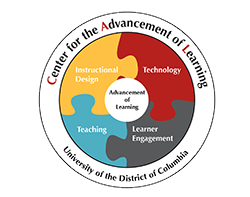UDC Online Program Checklist
The Center for the Advancement of Learning provides training, support, and resources for teaching and learning across modes of delivery.
Our signature programs are the online teaching certification and online building certifications. It is institutional policy that any individual who is the instructor of record for a course being offered in an emergency remote, hybrid, and or strictly online mode at UDC must be Online Teaching Certified (OTC certified). Any course that is designated in Banner as a hybrid or fully online course must be built by an individual who has been Online Build Certified (OBC).
The aforementioned resources can be used for any individual faculty member and/or program who wants to grow their online offerings.However, as a relates to growing an online program, the following is a checklist of considerations for stakeholders to use as they undergo the process:
- What is the rationale behind you wanting to put courses online and where is your program on the OCAO program review cycle? It is recommended by the office if the chief academic officer that programs that are converted Online are built as a result of the considerations contained in the review cycle. There are some cases where a program may not be performing well but an online version may enhance performance.
- How does hybrid and/or online delivery impact the objectives of your program and courses? In many cases different modes of delivery can serve as a source of advancing outcomes versus just trying to duplicate across modes.
- Are the faculty in the program certified to teach online at UDC?
- Are there enough built online courses for the program(s), and if not, who will be the individuals you have certified to build? Please note one builder can build more than one course.
- Offering the online version of your program will require approval through all institutional channels. Have you planned out a timeline from when having your courses built in relation to going through institutional approval processes? Have you reviewed CAL’s OBC schedule in relation to your plans?
Lastly, here’s a link to the Online Learning Consortium’s Quality Scorecard which is used internationally as a framework for consideration of building online programs. The scorecard is a great tool that can be used by a dean or chair with various parties of university leadership when considering going online.
For any questions regarding the development of online courses, email carl.moore@udc.edu
For any questions regarding the development of online programs, email mreid@udc.edu
Footnotes:
-
Catalog sequencing is important…
-
There are many steps to converting a course and or program online
-
Adherence to internal governance process is important to factor in for your timeline
Online Support Features of CAL
- Online Teaching Certification (Rolling enrollment)
- Online Building Certification (Offered Twice a Year)
- Peer Review Self-Assessment (Ongoing)
- CAL Peer Review Courses (Offered Periodically, See Below)
- Course Shell Templates (Ongoing)
- Course Conversion Service (as needed)
Peer Review Process Information:
- Submit Course to CAL for Peer-Review click here
- The course is peer-reviewed.
- Courses submitted by the end of the first week in April will be reviewed by the end of the first week in May (course can be offered during the spring, summer, and or fall semester of the following calendar year)
- Courses submitted by the end of the first week in June will be reviewed by the end of the first week in July (course can be offered during the spring, summer, and or fall semester of the following calendar year)
- Courses submitted by the end of the first week in October will be reviewed by the end of the first week in November (course can be offered fall semester of the following calendar year)
- Revisions (if necessary): You have one week to make revisions.
- Instructor receives OBC
- Course is UDC-certified
UDC Important Institutional Definitions
All courses at UDC are required to be built on the institution’s Learning Management System, Blackboard. This quality assurance requirement encourages a baseline student learning experience across courses. However, the degree to which courses leverage in person and or digital tools varies according to his type. Please see below for details definitions.
- Traditional Course: A course that meets entirely face-to-face; may utilize Blackboard as an enhancement. 0-19% online = Traditional course or technology enhanced traditional course.
- Hybrid/Blended Course: A course that combines online and face-to-face (F2F) instruction utilizing Blackboard. Physical meeting times must be listed in the Schedule of Courses. 20-79% online activities = Hybrid/blended course.
-
- Flex Course: Hybrid course that allow for student
- Online Course: A broad term that includes Distance Education courses and Blended Instruction. A course that provides most or all instruction over the internet and has no required on-campus components, except for proctored assignments or exams when applicable. 80-100% online activities = Online course.
- Emergency Remote Instruction: The institution must pivot based on a national pandemic or natural disaster (eg. Covid, Blizzard etc.)






